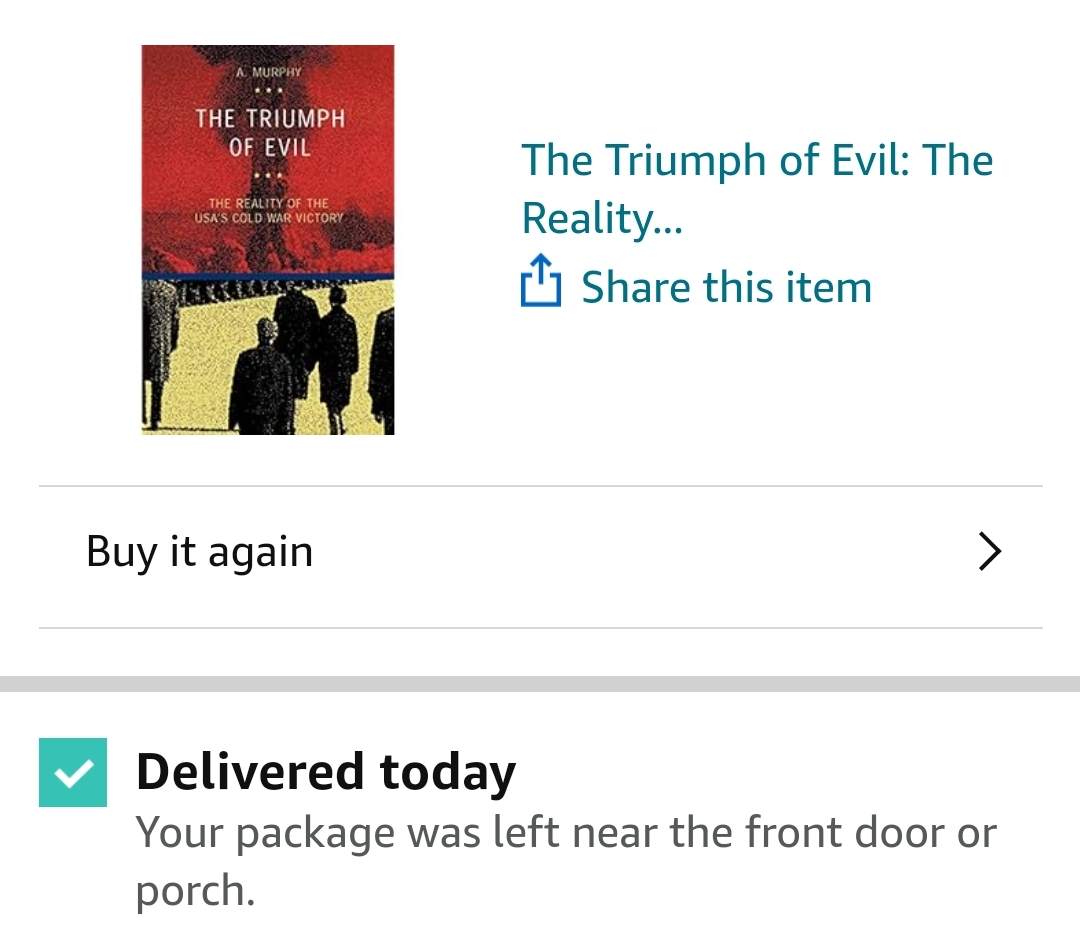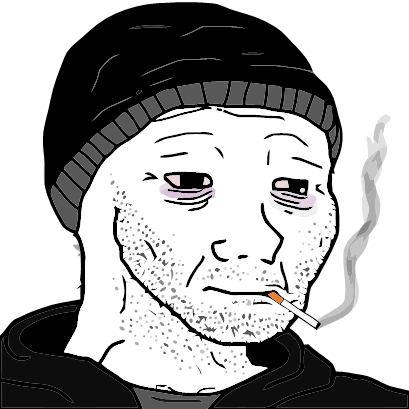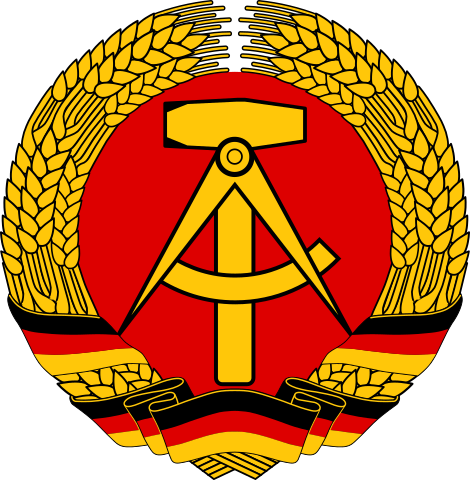[A] - https://farside.link/nitter/EuromaidanPress/status/1706356462304276701
But remember kids, no nazis in Ukraine, that’s a Russian talking point!
holy fucking shit
the nazis won, didnt they
They lost the war but won the peace, just like the Confederates before them. And both times it was the collaboration of American liberals and their anti-leftist objectives that enabled it.
Common Gabriel Rockhill W
Yeah :( nazi germany lost, but nazism won
Legit just had this book delivered today. Coincidence!?

…yes. But still.
was thinking about this earlier. It’s as much rewriting history as it is an actual reflection of the history, that the nazi project was stopped while simultaneously integrating them into the western bloc.
death to america and canada et al
“Many Ukrainians” being a tiny minority and the vast majority fighting in the Red Army instead.
It is a tragedy that the banderites have managed to change the perception of history as much as they have.
Blaming Jews for what nazis do. Bold strategy, Cotton! Let’s see how that turns out!

Western libs really are speedrunning the track to fascism, aren’t they?

Nope they just took a long time to let the mask slip.
Of all the ways they could have tried to spin this, “it’s a jewish lie” is perhaps the least surprising
2/3 In 1985, Canada initiated an independent investigation and established The Commission of Inquiry on War Criminals in Canada (the Deschênes Commission). None of the members of the Division “Galicia” who had settled in Canada were found guilty of committing war crimes.
I knew they would use the commission which did actively walk back from the Nuremberg decision - based on a ton of evidence - to declare the (Waffen-)SS a criminal organization due to its part in the Holocaust and Shoa.
https://en.wikipedia.org/wiki/Palikrowy_massacre
https://de.wikipedia.org/wiki/Huta-Pieniacka-Massaker
To name just two.
The commission was a really fucked up thing, too. It didn’t look into Nuremberg archives, didn’t acknowledge scholarly work, it didn’t ask neither Eastern Europe nor the Soviet Union for information or access to archives.
After the commission ended more empirical scholarly work was done which also strengthened the link between Galicia members (and sometimes even before they joined that unit) to war crimes and worse.
CW One of the commission consequences
As a result of the Deschenes commission, the Criminal Code was amended in mid-1987 to allow the trial of suspected Nazi war criminals living in Canada. In December of 1987, charges were laid against Imre Finta. (See also Finta Case.) Finta was the first Canadian to ever be prosecuted for war crimes under the new amended Criminal Code. He was accused of forcibly confining over 8,600 Jews in a brick factory located in Szeged, Hungary, in 1944, from which they would then be sent to the Nazi death camps at Auschwitz and Stasshof. Finta was ultimately found not guilty, and no further war crimes trials of Nazis or Nazi collaborators were ever held in Canada afterwards.
The jury was stacked and his involvement in the Holocaust clear: https://journals.lib.unb.ca/index.php/unblj/article/download/29656/1882524838/1882525145
Finta was accused of being in charge of bringing Jews from the ghettoes to the concentration centre in Szeged. He was allegedly in charge of the concentration centre and his responsibilities supposedly included making sure that the Jews were kept in the brickyard and could not escape. He also took charge of taking valuables from them and his trial counsel admitted that Finta made daily announcements demanding that the prisoners relinquish all valuables on pain of death. Finally, he allegedly supervised the loading of the prisoners onto boxcars which took the Jews to their deaths at Auschwitz or to forced labour in Strasshof.
The evidence against Finta is overwhelming and unanswered. Finta presented no evidence to answer the charges brought against him, either at his libel trials or at his criminal prosecution. When asked at his criminal trial if he wanted to call evidence on his own behalf, he declined. Yet, Finta was acquitted. How is it possible that Finta could win his case when he called no evidence on his own behalf and the evidence against him was overwhelming? The answer is that there was a stacked jury and an appeal to racial prejudice.
“Both the appeal and the cross-appeal were dismissed by the Court by a narrow margin of 4:3.”
The Crown’s case depended in large measure on the testimony of 19 witnesses who had been interned at Szeged and deported to the concentration camps. The evidence of these survivors fell into four general groups. Six witnesses who knew respondent before the events in issue testified as to things said and done by him at the brickyard and at the train station. A second group consisting of three witnesses who did not know respondent beforehand identified him as having said or done certain things at the brickyard and at the station. A third group consisting of three witnesses who did not know respondent beforehand also testified as to things said and done at the brickyard and at the station. However, this last group based their identification of respondent on statements made to them by others. The fourth group, consisting of eight witnesses who did not know respondent beforehand and did not identify him, gave evidence as to events at the brickyard and the train station. In addition to the evidence of the survivors, the Crown relied on photographs, handwriting and fingerprint evidence to identify respondent as a captain in the Gendarmerie at Szeged at the relevant time. Expert and documentary evidence was tendered to establish the historical context of the evidence, the relevant command structure in place in Hungary in 1944 and the state of international law in 1944.
and
Douglas Christie made the purport of these remarks quite dear later in the trial. He asked, “It is very difficult for a Jewish person to be unbiased about the subject of the Holocaust?” and “You [Randolph] advance the Jewish understanding of history?”36 This Holocaust denial-oriented questioning of Braham was prolonged and elaborate. Christie’s questioning of the witness Wolfgang Scheffler was similar. In one exchange, Christie tied together his themes of Holocaust denial and Jews as greedy people.
He suggested that Jews deny the Holocaust in order to make money through reparations. Douglas Christie asked, “Dr. Scheffler, the Holocaust is big business, isn’t it?”37 The Crown objected and Christie replied, “It is my intention to suggest that there is a motive on the part of many people who are Zionists to exaggerate these things [the Holocaust] to inflate their claims [for reparations].” The ruling of the judge was to “go ahead.”
CW
Canada did not even sentence people when there were 6-19 eye witnesses of their participation in the Shoa - without threat to their lives. Don’t give a fuck about the commission.
The Nazis have investigated themselves and found no wrongdoing
The argument seems to be “he wasn’t literally operating the gas chamber, so therefore he wasn’t involved in the holocaust”
“It’s unfair to say that every German who was in the military was complicit in the Holocaust. Very unnuanced and shows a complete lack of understanding of history.”
“Every Russian citizen who isn’t sabotaging railways and blowing up infrastructure is responsible for Russia’s turbogenocide in their unprovoked illegal terrorist invasion of Ukraine. We need to send Russian migrants back to Russia so they can oppose Putin instead of running away.”
He joined in 1941-1943 (one source said with 16, another said the volunteer unit was founded afterwards), there is quite a lot of evidence that Ukrainian volunteer troops in that time did partake in the Shoa, in “anti-partisan” actions and also genocides against polish and others.
Nationalists did try to diminish those facts, or did blame other units.











